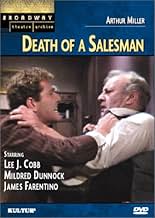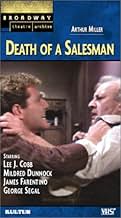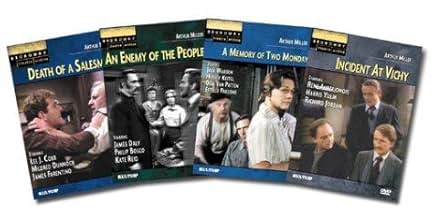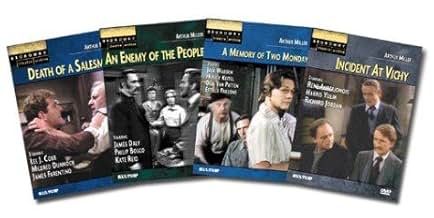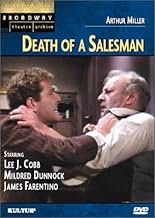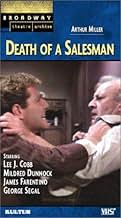Ajouter une intrigue dans votre langueAn abridged award-winning television adaptation of a famous play about an aging travelling salesman who's on the verge of a nervous breakdown. His job is gone, and his family hates him for n... Tout lireAn abridged award-winning television adaptation of a famous play about an aging travelling salesman who's on the verge of a nervous breakdown. His job is gone, and his family hates him for never being there. He tries mending things with them.An abridged award-winning television adaptation of a famous play about an aging travelling salesman who's on the verge of a nervous breakdown. His job is gone, and his family hates him for never being there. He tries mending things with them.
- A remporté 3 prix Primetime Emmy
- 5 victoires et 8 nominations au total
Marc Fiorini
- Stanley
- (uncredited)
Avis en vedette
The only slight reservation I have about this TV version of the play is the fact that it was clearly shortened for the medium. The greatest thing about this recording is that it preserves Lee J. Cobb's interpretation of the lead role. I was enrolled in a drama school in the early 60s, a time when several of our teachers had actually seen him in the 1947 stage play. They would frequently speak, in reverent tones, of the scorching great performance that Cobb delivered. This 1966 television revival makes Cobb seem all the more remarkable to me due to the nearly twenty year interval that had passed since the New York run of the play. No matter how great a performance he might have initially delivered, many an actor would have lost a lot of the original intensity in that span. On top of this, Cobb had experienced a battering ordeal at the hands of the House on Un-American Activities Committee toward the end of the run of the play. There is a fascinating story behind Cobb's development of the role. During rehearsals, the director was considering replacing Lee, as his work was not showing promise. The story goes that, at a critical point, Cobb had been staring at a crack in a wall in the rehearsal space. Suddenly he was seized by a strong sense of the character which immediately endowed his reading with uncanny feeling and intensity. Late in the run, it is told that the characterization took such a pervasive hold on the actor that he started to take it home with him, unable to snap out of it.
Arthur Miller's play is an American classic, timeless and poignant. I've seen three film/TV and one stage version of the play. Lee J. Cobb's performance is the most powerful and frightening, comparable to his earlier performance in "12 Angry Men". As far as the character of Willy Loman and the sales profession a recommended viewing of "Glengarry Glen Ross" would be enlightening.
Willy Loman never realises until the end that he is a loser. Although his son Biff knows he himself is a loser, his father won't accept this. Son, Hap, like his father doesn't know he is a loser, either. Miller seems obliquely to imply that society is to blame for Willy's sad life. Maybe so, surely society doesn't cut him much slack, especially as represented by the son of his long time firm, for which he has been a fairly successful salesman much of his life. Whatever one's opinion on this subject, the play certainly portrays very genuine emotions and problems as the aging Willy more and more loses contact with reality and harkens back to nodal points in his life, especially contacts with his successful brother Ben. Or is Ben just a figment of his imagination. We can only guess. At the final funeral scene, Hap's losing philosophy continues. Could he and Biff take Willy's $20,000 insurance award and make it as ranching partners out west? We'll never know; Hap is determined to "make it big" in the Big Apple. Fat chance!
A better cast would be hard to imagine and the stage setting is beautifully photographed. The "fantasy" scenes are smoothly integrated with bits of "movie magic" that emulate what would be accomplished in the theatre with tricks of lighting. Cuts from the complete play are minor. This was TV at its best.
A better cast would be hard to imagine and the stage setting is beautifully photographed. The "fantasy" scenes are smoothly integrated with bits of "movie magic" that emulate what would be accomplished in the theatre with tricks of lighting. Cuts from the complete play are minor. This was TV at its best.
Just got this from Broadway Theatre Archive. I would recommend this to anyone remotely interested in this play and the history of American theater. While not the "film" the Dustin Hoffman version is, I found it more moving. It preserves two great performances, the original ones on Broadway. Lee J. Cobb is amazing. More than any other performance of this I've seen, he successfully shows Willy's horrifying diminishment in mental capacity while losing none of his character's or the play's emotional power. Mildred Dunnock is softer toward Willy than her successors but shows the steel within her when she deals with her sons. All in all a heartbreaking performance.
George Segal is good as Biff, but unlike the more evenly balanced Dustin Hoffman-John Malkovich version, is somewhat dwarfed by Lee J. Cobb's Willy. James Farentino, who made a superb Biff on Broadway with George C. Scott, makes a superb Hap.
George Segal is good as Biff, but unlike the more evenly balanced Dustin Hoffman-John Malkovich version, is somewhat dwarfed by Lee J. Cobb's Willy. James Farentino, who made a superb Biff on Broadway with George C. Scott, makes a superb Hap.
Seeing Lee J. Cobb as Willy Loman in this David Susskind produced version is as close as possible to seeing the original play on Broadway, and a far sight better than just about any live production one could find nowadays.
Mr. Cobb's performance is so absorbing, so powerful and so disturbing, that we, (the audience) feel genuinely dazed at its conclusion. It's as though, by the time of the final scene, that we too, are attending Willy's funeral, and all stumble away drained and awed.
The supporting cast are each and all superb, with Mildred Dunnock probably topping anything else in which she has appeared. Set design is also inventive in its combination of abstract and realistic interiors and exteriors.
As to the character of Willy, it is to Mr. Cobb's credit, that for all of his past moral compromises and shabby aspirations, the most honest of us, will admit that we recognize something of ourselves in him.
Theater and television at its best! Thank you Mr. Susskind. (Also interesting to note Karen Steele relegated to a bit role while still such a young woman--what a step down from "Marty.")
Mr. Cobb's performance is so absorbing, so powerful and so disturbing, that we, (the audience) feel genuinely dazed at its conclusion. It's as though, by the time of the final scene, that we too, are attending Willy's funeral, and all stumble away drained and awed.
The supporting cast are each and all superb, with Mildred Dunnock probably topping anything else in which she has appeared. Set design is also inventive in its combination of abstract and realistic interiors and exteriors.
As to the character of Willy, it is to Mr. Cobb's credit, that for all of his past moral compromises and shabby aspirations, the most honest of us, will admit that we recognize something of ourselves in him.
Theater and television at its best! Thank you Mr. Susskind. (Also interesting to note Karen Steele relegated to a bit role while still such a young woman--what a step down from "Marty.")
Le saviez-vous
- AnecdotesIn his autobiography "Timebends", Arthur Miller said that Lee J. Cobb was his favorite Willy Loman.
- ConnexionsFeatured in Role Model: Gene Wilder (2008)
Meilleurs choix
Connectez-vous pour évaluer et surveiller les recommandations personnalisées
Détails
- Date de sortie
- Pays d’origine
- Site officiel
- Langue
- Aussi connu sous le nom de
- La muerte de un viajante
- Lieux de tournage
- société de production
- Consultez plus de crédits d'entreprise sur IMDbPro
Contribuer à cette page
Suggérer une modification ou ajouter du contenu manquant

Lacune principale
By what name was Death of a Salesman (1966) officially released in Canada in English?
Répondre

